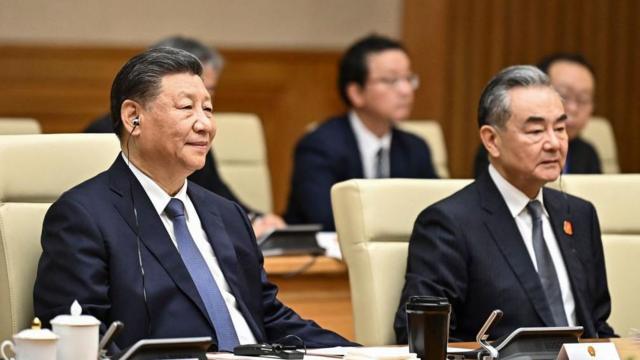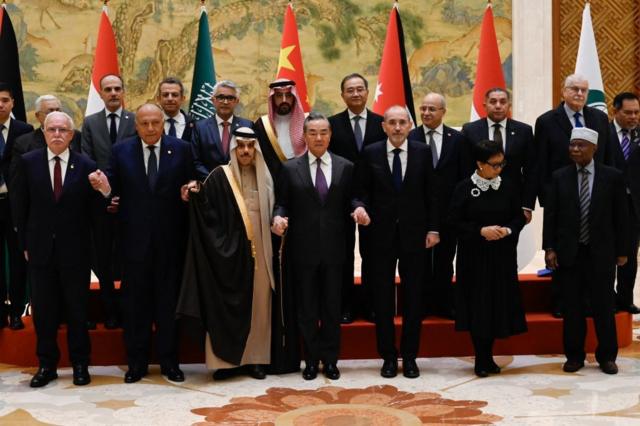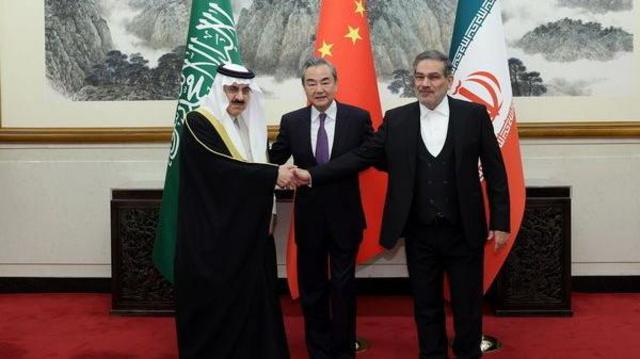
How did China beat the U.S. diplomatically?
Sumaya Nasr
China has narrowly overtaken the United States to become the world's largest diplomatic power today, according to the 2024 Global Diplomacy Index.
Although the difference between the two countries is small, the report by the Lowy Institute, an independent research organization based in Sydney, points to Beijing's efforts to expand its international influence amid intensifying geopolitical rivalry with Washington.
According to the report, China diplomatically outpaced the US in Africa, the Middle East, the Pacific Islands and Central Asia, while the US maintained its lead in Europe, North and Central America and South Asia, and the two countries were tied in the Middle East and South America.
The index ranks the diplomatic power of 66 countries based on the number and size of their diplomatic missions around the world.
What does it mean for China to be the country with the largest diplomatic presence in the world? Does China's approach to diplomacy differ from that of other countries, such as the United States?
"Strategic Partnerships"
In his book "Diplomacy: Theory and Practice," J.R. Berridge describes diplomacy as "essentially a political activity. Berridge describes diplomacy as "a fundamentally political activity which, if well resourced and skilled, is an essential component of influence. Its main goal is to enable states to achieve their foreign policy objectives without resorting to force, propaganda, or law. This is achieved primarily through communication between professional political officials."
China currently has a complex network of diplomatic relationships that it categorizes as "strategic partnerships" that have evolved and expanded over the years. In January, Chinese Foreign Minister Wang Yi outlined his country's diplomatic goals for this year, saying that Beijing will remain committed to expanding its "network of international partnerships," that it favors building a multipolar world, and that it supports "equality for all countries."
"The People's Republic of China and the United States have the largest number of embassies and diplomatic missions in the world, reflecting the size of the two countries and their GDP, but also their quest to become a great power, in an era of heightened tensions arising from geopolitical competition," says Professor Astrid Nordin, the Lau Chair in International China Relations at King's College London.
It is noteworthy that China does not seem to seek to enter into traditional alliances. Rather, it prefers to characterize its relations with countries as "partnerships" aimed at "coordination" and mutual support for security, military, political and economic interests without any commitments similar to those implied by alliances such as NATO, for example, which gives it a margin of maneuver and allows it to change the nature of relations between it and other countries in the future.
Perhaps the only exception is North Korea, which is China's only official ally. In 1961, the two countries signed a "Treaty of Friendship, Cooperation and Mutual Assistance," which their leaders decided to renew in 2021 on the 60th anniversary of its signing.
A long list of countries with which China has relations described as "strategic cooperation partnerships" or "comprehensive strategic partnerships" includes many countries in the world such as Russia, Pakistan, Kenya, Congo, Ethiopia, Cambodia, Sri Lanka, Algeria, Egypt, Argentina, Iran, Italy, and Poland.

Why is diplomacy important to China?
Last December, at a conference discussing the country's foreign affairs, Chinese President Xi Jinping outlined the foundations of China's foreign policy, which included utilizing China's growing weight in international affairs to promote development and prosperity, and applying a "correct understanding of history and the big picture" when dealing with global trends.
Diplomacy is of great importance to Beijing in its quest to become a great power, not only economically, but also politically. In addition to being a means of communication and interaction with foreign countries, Professor Nordin says it also "sends a signal to the Chinese people that their country, under the leadership of the Communist Party, has many friends, is valued by others, and actively pursues Chinese interests around the world."
"The Chinese people are the most important audience for Chinese diplomatic activity. "The large volume of diplomatic activity sends a message to the public that China is more committed to solutions and peaceful relations than the United States.
China's mediation between Iran and Saudi Arabia, which culminated in the two countries resuming diplomatic relations last year after years of estrangement, is arguably a major victory for Chinese diplomacy. Observers see it as signaling the start of a new era for China's growing diplomatic role.
China was also keen to play a role in mediating between Israel and the Palestinians in the wake of the recent Gaza war, hosting Arab and Muslim officials to discuss the situation in November. The US reportedly asked Beijing to urge Iran to calm down. Beijing has also sought to mediate between Moscow and Kiev in the Ukrainian war, announcing a 12-point plan aimed at achieving "political stability."

What characterizes China's approach to diplomacy?
In Xi Jinping's speech at the World Economic Forum, the Chinese president outlined his country's diplomatic orientation, saying: "We should follow the trend of history, build a stable international order, uphold the common values of humanity and build a society with a common future for mankind... We should favor dialogue over confrontation, inclusion over exclusion, and stand against all forms of unilateralism, economic protectionism, hegemony and power politics."
Chinese diplomacy seeks to emphasize Beijing's preference for peaceful solutions over conflict. The cornerstone of China's diplomatic discourse in many parts of the world, according to Professor Nordin, is that "China is seen as a peer partner with no history of colonization and exploitation, unlike the United States and other countries in the 'West'."
At the same time, Nordin adds, "Chinese diplomacy is often emotionalized - for example, not carrying out the wishes of Chinese diplomats is sometimes portrayed as offensive and hurtful to the 'feelings of the people'. This style stems more from the Communist Party's internal culture than from 'Chinese culture', where the most important thing in a diplomat's career at the moment is to express loyalty to President Xi Jinping, even when this may conflict with other goals such as building friendships."
But Nordin explains that this approach is not unique to China. "For example, if Trump wins the presidency in this year's election, that could make loyalty a determining factor in U.S. politics as well."

China seems willing to work with any country as long as there is a mutual benefit to be realized - as evidenced by the long list of countries with which it has a partnership. China dialogues with Iran, Israel and Palestinian leaders, with Russia, with which it has a strong relationship, with Ukraine, with Saudi Arabia and with the Houthi Ansar al-Houthi group in Yemen. This contrasts with the approach of U.S. diplomacy, which refuses to engage with countries such as Syria, Cuba and Venezuela, which some U.S. observers see as an affirmation of American power, while others say it prevents Washington from expanding its sphere of influence.
China's critics argue that it seeks to capitalize on Washington's weaknesses and that it does not care about the values of human rights and democracy that Washington defends. Its supporters argue that it views relations with countries from a utilitarian, non-ideological perspective, and that the US is "selective" in its support for democracy and human rights, sometimes using these values as a weapon against its enemies.
"I think Chinese diplomacy has no problem communicating and interacting with any country it recognizes, but diplomatic relations are usually frozen with countries that go against the interests of the Chinese Communist Party," says Professor Nordin. "Perhaps both countries are focused on projecting a good image to their domestic audiences - cutting ties with 'bad' countries may be seen as a way to win over a wide swath of American public opinion, compared to the Chinese people who are more interested in the Republic of China being the country with the most ties.
(Source: BBC)








